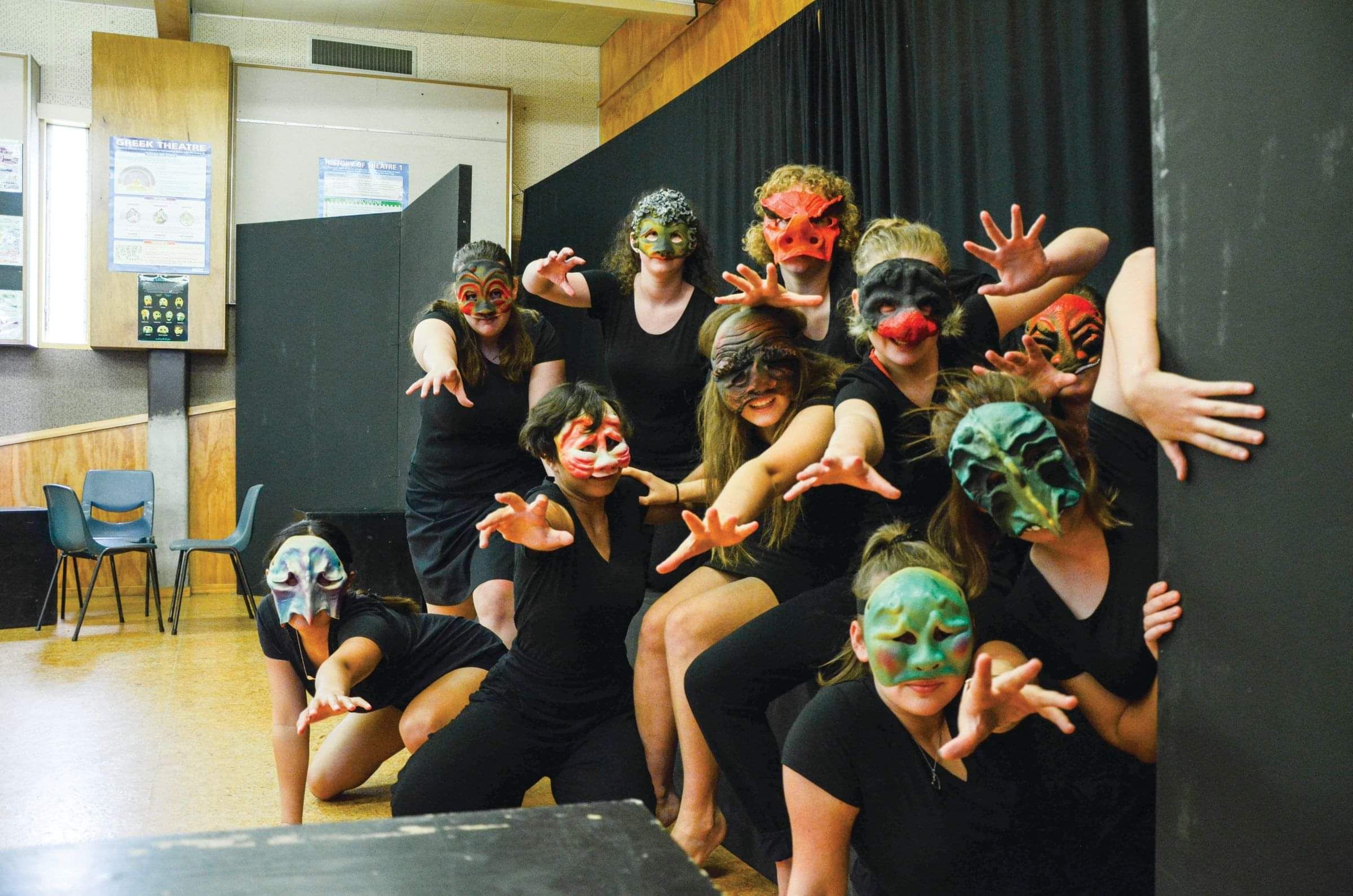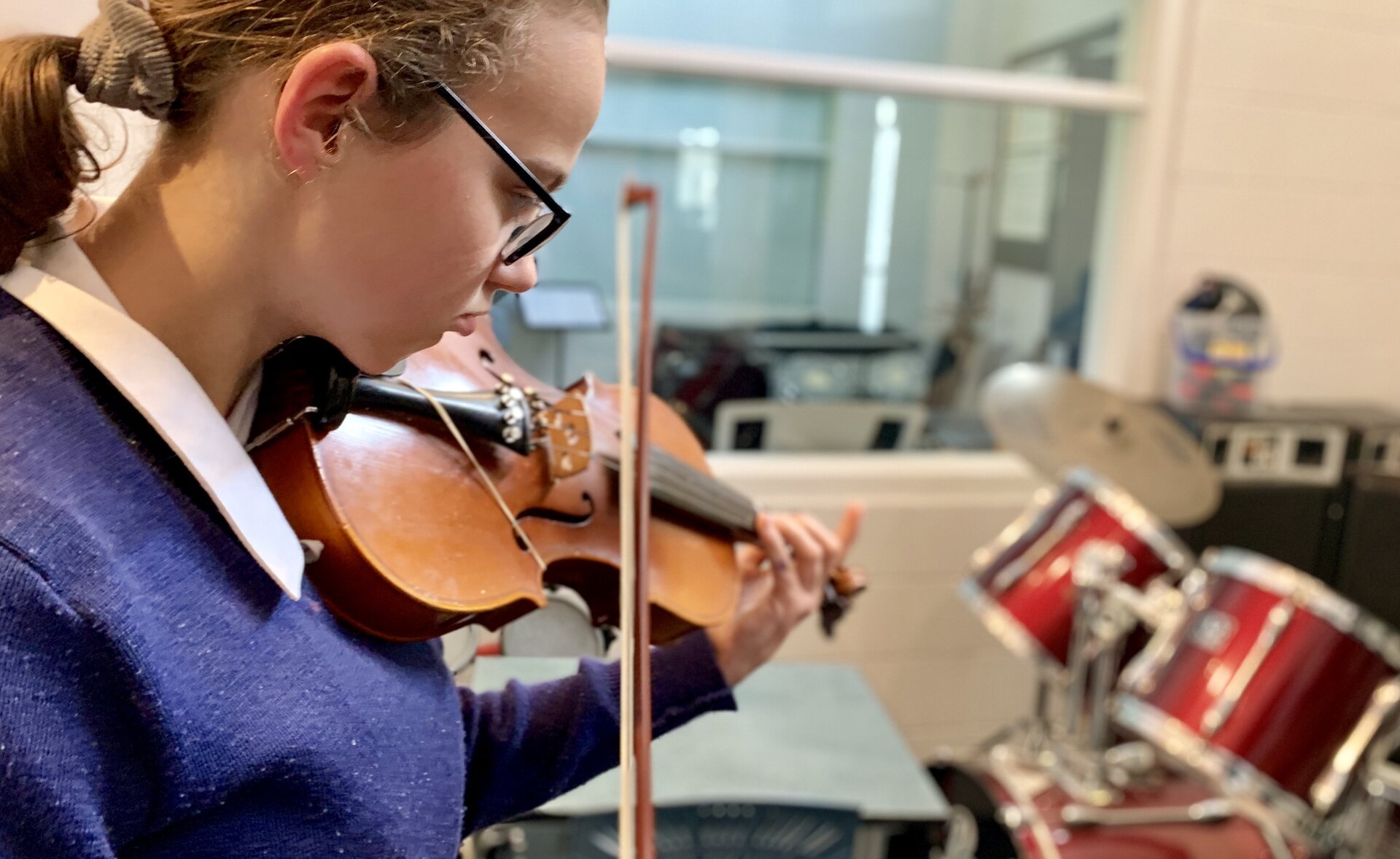PERFORMING ARTS
The Senior Performing Arts curriculum at Hastings Girls' High School goes beyond just skill acquisition; it’s a transformative journey that shapes well-rounded individuals. By participating in these programmes, students develop the confidence to stand in the spotlight, the humility to collaborate as part of a team, and the resilience to overcome challenges. These qualities are not only beneficial within the performing arts arena but also serve as valuable life skills.
Through Te Ao Haka, Dance, Drama, and Music, students discover new dimensions of themselves and the world around them. They learn to express ideas, emotions, and narratives in ways that transcend conventional communication methods. These programmes foster creativity, cultural understanding, and personal growth, preparing students to thrive in an ever-evolving global society.

Students will join us on a journey of self-discovery and artistic exploration. Students will have the opportunity to immerse themselves in the world of Te Ao Haka, Dance, Drama, and Music, and experience the transformative power of the performing arts. At Hastings Girls' High School, we believe in nurturing the desire to create, communicate, and connect.
The Performing Arts are a powerful form of personal, social and cultural expression. The Arts pass on and renew our heritage and traditions, and help to shape our sense of identity.
Through studying the Performing Arts, students are given skills and ways to create unique ideas and images that reflect their view of the world. Students are challenged and taught to question perception, and understand how the arts enrich our emotional and spiritual lives.
Essential Skills:
Creativity, collaboration, co-operation, innovation, critical thinking, adaptability, performance preparation, presentation skills, personal achievement, confidence, perseverance, resilience.
Courses on offer:
Level 1 & 2
Te Ao Haka - Māori Performing Arts
Music
Drama
Dance
Level 3
Music
Drama
Dance
Career Pathways:
There are many Performing Arts related fields of employment that naturally grow from courses in the Performing Arts (e.g. lighting operator, sound technician, set designer, costume designer, director, producer, script-writer, actor, live theatre, television, musician, composer, teacher, film making, reviewer) but many people also pursue careers outside the arts using the analytical, creative, co-operative, entrepreneurial and problem-solving skills that have been enhanced through a learning that is grounded in the Performing Arts (e.g. project management, event planning, communications, media, music therapy)
LEVEL 1/2/3
Te Ao Haka - Māori Performing Arts
Our Senior Māori Performing Arts course is an exciting new opportunity for our wāhine to engage in all aspects of Te Ao Haka and performance from a Māori perspective. It is open to all senior students.
Students will explore using movement, style, language, and content specific to Te Ao Haka. Our wāhine will refine their understanding and use of the unique Tikanga and Reo features needed to express a deeper understanding of what Te Ao Haka is. Tauira will observe and analyse existing Te Ao Haka performances as well as a variety of other Toi Whakaari performances.
This course has internal and external Achievement Standard Assessments at NCEA Level 1 and 2.
Level 3 is available to those students who are truly committed to the subject.
Entry Guidelines: Students enrolling in Senior Māori Performing Arts must actively participate and perform in the school rōpū Kapa Haka
Teacher in Charge: Whaea Oriana Kershaw
Dance
This course is for dance students who have experience in performing at a high level in a specialist dance discipline and passion for choreography. Through this course, students will have the opportunity to choreograph solo and ensemble sequences, perform as a soloist and part of an ensemble, and study the elements of dance specific to a genre or style of their choice.
It is important to note that NCEA Dance at Level 1, Level 2 and Level 3 requires both written and performance components.
Entry Guidelines: Entry to this course is by audition and interview with the HOD Performing Arts.
Teacher in Charge: Mrs M Ferguson
UE Approved
LEVEL 1
Drama
Our Level 1 Drama and Production Skills course is tailored to the interests and needs of our girls. Whether you want to specialise in a particular area of drama or production, this Drama course provides the skill and knowledge development to allow you to be the best drama practitioner you can be. This course gives support to achieve NCEA Level 1 and to become immersed in the world of Theatre.
The areas and skills available to study are:
Performing solo or group drama performances
Developing rehearsal and performance skills and techniques
Writing scripts, devising your own drama pieces and learning to direct others
Learning about different types of theatre forms
Exploring the different skills and roles that exist in performance, theatre and film
Gaining knowledge and experience of stage makeup
Gaining knowledge and experience of stage lighting and sound and how to use them in performance
Gaining knowledge and experience of using and creating props and sets
Students will be exposed to professional performances and have the opportunity to interact with professionals working in their fields.
Students will also learn useful life skills like collaboration, creativity, problem solving, communication and expression.
Entry Guidelines: Interest in Drama and performing
Leads to: Level 2 Drama, Scholarship Drama, personal enjoyment, numerous careers, university study
Teacher in Charge: Mrs M Ferguson
Music
This music course is highly practical. You will be singing or playing every lesson either in group work or as a soloist. The focus is on learning how to pull music apart and how to put it back together in your own way. You will learn to be a confident and skilled musician who has a type of music in which you excel, but also has the courage and knowledge to give all types of music a go.
Students will learn about the mechanics of different musical styles and genres as well as making connections between music that they hear in films, on the stage, in games, on streaming platforms and apply these to their work.
In this class, students will explore the exciting realms of rhythm, melody, and harmony, gaining a deep understanding of musical notation and terminology. Through engaging practical exercises, they'll develop their instrumental or vocal skills, cultivating the ability to perform with confidence.
By the end of the NCEA Level 1 Music class, students will have a strong grasp of musical theory and concepts, and an enhanced ability to interpret and create music.
Entry Guidelines: Junior Music or Te Ao Haka, or by interview for specific students. Students must keep in mind Level 2 Music is required for entrance to Level 3 Music. All students will be required to undertake private tuition in the primary instrument (or voice) of their choice. This will be either through the HGHS Music tuition programme (free of charge) or with an external private tutor of your choice.
Leads to: Levels 2, 3 and Scholarship Music
Teacher in Charge: Mrs M Ferguson
UE Approved
LEVEL 2
Drama
Our Level 2 Drama course is tailored to the interests and needs of our girls. The Drama course provides the skill and knowledge development to allow you to be the best drama practitioner you can be, both to achieve at NCEA Level 2 and to become involved in the world of theatre.
The areas and skills available to study are:
Performing solo or group drama performances
Rehearsal and performance skills and techniques
Writing scripts, devising your own drama pieces and learning to direct others
In-depth understanding of a complex theatre form
Exploring the different skills and roles that exist in performance, theatre and film
Students will be exposed to professional performances and have the opportunity to interact with professionals working in their fields.
Students will also learn useful life skills like collaboration, creativity, problem solving, communication and expression.
Entry Guidelines: Level 1 Drama helpful but not essential
Leads to: Level 3 Drama, Scholarship Drama, personal enjoyment, numerous careers, university study
Teacher in Charge: Mrs M Ferguson
LEVEL 2/3
Music
Level 2 and 3 Music is a practical course where you can build your performance skills as students work towards becoming an accomplished musician. This comprehensive curriculum offers an enriching journey that blends foundational concepts with advanced techniques, catering to students with varying levels of musical knowledge and skill. At Level 2, students delve into the fundamentals of music theory, exploring notation, scales, chords, and rhythm. They engage in hands-on activities, refining their instrumental or vocal skills through practical exercises. As they progress to Level 3, the complexity of musical theory deepens, encompassing topics such as harmony, analysis, and composition. Students have the opportunity to craft their own musical compositions, fostering creativity and originality.
Entry Guidelines: Level 1 Music. Level 2 Music is required to enter Level 3 Music. All students will be required to undertake private tuition in the primary instrument (or voice) of their choice. This will be either through the HGHS Music tuition programme (free of charge) or with an external private tutor of your choice.
Leads to: Level 3 and Scholarship Music
Teacher in Charge: Mrs M Ferguson
LEVEL 3
Drama
Our Level 3 Drama course is tailored to the interests and needs of our girls. The Drama course provides the skill and knowledge development to allow you to be the best drama practitioner you can be, both to achieve at NCEA Level 3 and to become fully engaged in the world of theatre.
The areas and skills available to study are:
Performing solo or group drama performances
Advanced rehearsal and performance skills and techniques
Devising your own conceptual drama pieces
Interpreting significant plays
Writing one-act play scripts
Learning to direct others
In-depth and insightful understanding of a complex theatre form or drama practitioner
Students will be exposed to professional performances and have the opportunity to interact with professionals working in their fields.
Students will also learn useful life skills like collaboration, creativity, problem solving, communication and expression.
Entry Guidelines: Level 2 recommended but not essential
Leads to: Scholarship Drama (to be taught in conjunction with Level 3), numerous careers, university study, personal enjoyment
Teacher in Charge: Mrs M Ferguson
UE Approved
FUTURE CAREERS
Actor, Arts administrator/management (includes box office, concert series, programming house manager), Conductor, Band/choral director (schools, military, theatre, community, resorts, cruise companies), Performer or Collaborative musician (orchestra, accompanist, repetiteur, musical theatre, recording/session musician), Copyist, transcriber, arranger, Designer (sets, costumes, lighting), Wardrobe designer/manager, Digital score recordist/Media development, DJ, Director (film, theatre, TV), Educator (K-12, college, university, conservatory, religious organizations, private studio), Electronic and Digital production and design (including audio engineering, mastering, mixing, music directing, producing, program directing, programming, recording engineer, studio manager, MIDI technician), Entertainment lawyer; music business lawyer, Entertainment journalist, features writer, Event production, management, planning, direction, Film scoring (Composing, editing, supervising, arranging/adapting, mixing, conducting, orchestrating, synthesis specialist, theme specialist), Fundraiser, grant writer, Instrument builder, designer, tuner, Librarian, Lyricist, Make-up Artist, Marketing/promotion, Music agent/artist representative/talent representation (booking, management), Music critic or reviewer, Music for game development, Music licensing, publishing and clearance, Social worker, Music therapist (injury prevention and intervention), Youth and community worker, Public relations agent or coordinator, Radio/TV – programming, research, management, Songwriter/producer (including composer, lyricist, producer; jingle writing for television, radio and internet; freelance work; librettist), Screen writer (film, TV, advertising), Playwright, Sound mastering/recording (Sound engineer, producer, technician)
